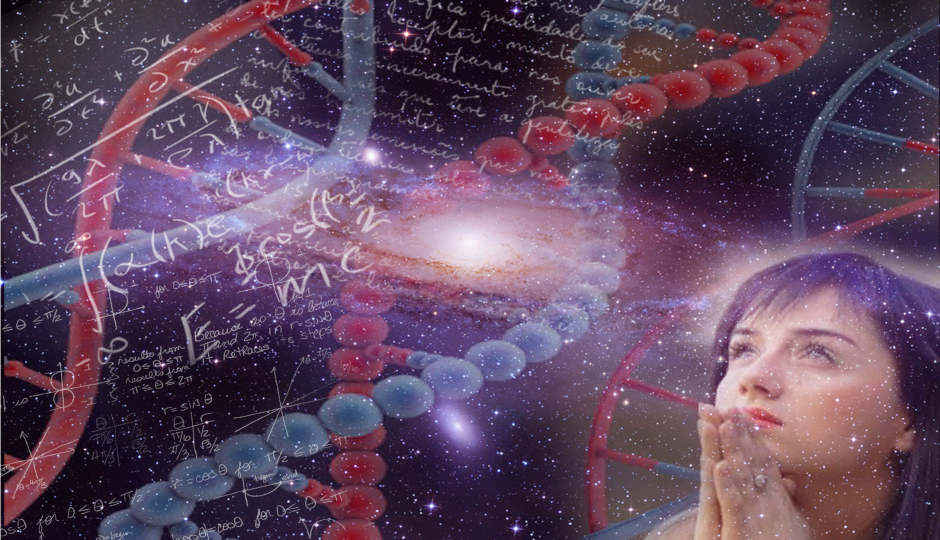The Ultimate Battle: God versus Science
You'd think Digit votes science right? Wrong! We're not choosing sides, we never do. We just examine the evidence...

Yes. That old question again. Why? Well, because it never really gets old. And while people keep talking about it, people like us shall oblige and print yet another article on the subject. So let us have a little chat about these two behemoths that have the world wrapped around their composite little fingers.
 Survey
SurveyGod’s been around longer…
Even if we take Darwin’s theory of the origin of the species into account, saying that life on earth was a result of a confluence of favorable events (just the right conditions in the ocean at just the right time, creating the first single-celled organisms) a devout man would always argue with ‘it was a higher power who set the ideal conditions’. And in the interest of giving credit where it is due, when mankind was walking around, fresh off the trees, club in hand, we didn’t attribute lightning to an electrostatic discharge between the electrically charged regions within clouds or between a cloud and the surface of a planet. It was easier to blame superior, omniscient beings. Yes, back then it was more likely that that the gods of thunder, air, wind and sky were responsible. So in all due fairness, gods were the ones who set the worldly stage in our minds since time immemorial. They have helped human evolution at the spiritual level, taking the blame for anything that went wrong in the world, so that we could concentrate on evolutionary progress. Without the training wheel that was a supreme power, humanity’s evolution may not have proceeded in the direction history shows us it did. So score one for the Lord!
Score: Science: 0 / God: 1
…but Science is all around us
Science has a one-up over the powers of Godliness – it’s tangible. As mysterious as your supreme power’s ways are, science has had the added advantage of being based on quantifiable and observable fact. Science has its own laws, which may be occasionally malleable and bend to accommodate new discoveries, but refuse to break. The one reason why reason is so popular is because people have an obvious tendency to believe the physical over the metaphysical. It’s a page out of Plato’s Theory of Forms. While the idea of something is purer and more appreciated, one must make do with the physical embodiment of the idea, since it is more palpable and can be physically experienced as opposed to the spiritual. Considering a huge chunk of the life that we do know exists is in the realm of the physical, it’s not a big surprise that scientific advancement has been on a rise since before the term ‘scientific advancement’ was actually coined.

God – in sickness and health
The all-time favorite goal of humanity has always been to achieve the impossible – a goal that seems more within our grasp by the decade. Majority of these achievements being through science. Science takes a point, here.
Score: Science: 1 / God: 1
Battle of the Publishers
Cutting down to the core of proof of the existence of an all-powerful being, most religious people hold open their religious texts as proof that God (or his proclaimed son/prophet) existed and passed on teachings through his human delegates. Well, if holy texts are proof of God’s existence, Stephen Hawking and Leonard Mlodinow’s book ‘The Grand Design’ is the counter-argument debunking the claim that the Universe was created by one or even many beings. The core statement of their ‘Multiverse’ argument is to explain “the fine tuning of physical law without the need for a benevolent creator who made the Universe for our benefit. Because there is a law like gravity, the Universe can and will create itself from nothing. Spontaneous creation is the reason there is something rather than nothing, why the Universe exists, why we exist.” Drawing inspiration and comparing their argument to Darwin and Wallace’s theory of evolution, Hawking and Mlodinow make some very valid deductions of reasoning.
Score: Science: 2 / God: 1
The Qualia of religious belief
First used by Clarence Irving Lewis, an early 20th Century American philosopher, ‘qualia’ is loosely used to refer to individual instances of subjective, conscious experience. The theory of Qualia states that the personal experience of any individual is impossible to replicate identically with another. Even with something as simple as the perception of colour. We all know what each colour is supposed to look like. We define it by giving it a name. For example, the colour green. While most of us can distinguish green from the other colours, our perception of the colour itself is unique to each of us. We have no way of proving that the other person sees ‘green’ the same way as we do. While each of us can point out the colour off a lineup of colours, actually perceiving it the way others do is beyond our capabilities. Similarly, each individual’s experience with their belief in a higher power is unquantifiable. Which is where the gap in communication between the atheists and theists occurs. The lack of personal experience either way is one which is beyond anyone to bridge. Divine faith or any other kind of belief is meant to personal and tailored to each individual. At least until science advances to a level of telepathic communication.
Score: Science: 3 / God: 1
The logic behind the afterlife wager
Whoever said religion and religious belief was illogical? Sure, blind faith of any kind may seem to lack fundamental logic, but even logic can have a justification for the religious belief of life beyond death. Blaise Pascal was the man to look at the situation beyond bias of any kind. Religious beliefs of any kind have one major lifestyle choice in common – If you do good things, you shall be rewarded in the afterlife. The logic behind Pascal’s theory renders the belief in that theory as a whole redundant to the outcome. Assuming you do believe in life after death, the outcomes are set out in front of you. But even if you don’t believe, there are two possible outcomes – first, that there is life after death, at which point, doing good deeds may indeed be a good idea. Second, there isn’t an afterlife. In which case, it doesn’t matter anyway. Logically, being a good person doesn’t really have a downside. Ergo: be a nice person. Period.
.jpg)
A logical afterlife?
Of course, there is always the underlying counter-argument to the same. What if doing good deeds doesn’t take you to heaven, and that the philosophy behind it is a massive ruse propagated by whichever evil ruler of the afterlife you believe in to ensure that you make your way to the dark side? Skidoosh. However, considering we’re looking at a fair, just and balanced world, we can disregard that assumption and go with what we know people believe as a whole. So:
Score: Science: 3 / God: 2
Scientific theory beyond the intellectually elite
Scientific fact is not a subject comprehended by many, including several hundred thousands of people who accept scientific fact as dogma (yes, we see the irony). If someone tells you about the Higgs Boson and preaches the mathematical proof of its existence, it may not be comprehended by every interested person in all its glory. Yet, the existence of the God particle is accepted by the scientific community as large since it has been verified by experts in that particular field. When seen in this light, majority of people who believe in it do so at face value. Why then, should a person who has studied the path of the divine all their life not be taken seriously. Why is it so difficult to take something so metaphysical as a supreme power at face value? Is faith a matter of hypocrisy? Or are some people simply more conditioned to believe that scientists are more trustworthy than a person of God?
Score: Science: 3 / God: 3

God, give us the strength…
Why the stalemate?
Despite any arguments presented by people, Science and God have really done nothing to be butting heads. They are – like most ideals and beliefs – content in being exactly where they are, existing for the sake of existence. Their enmity is a fallacy that we, being mortal human beings propagate to feel good about ourselves. They are, in fact, the idiomatic philosophers who meet every weekend for a nice long talk over scotch and cigars, chuckling amongst themselves, sharing the joke mankind so retardedly strives to understand.
Also Read: Preparing your digital media for your inevitable demise